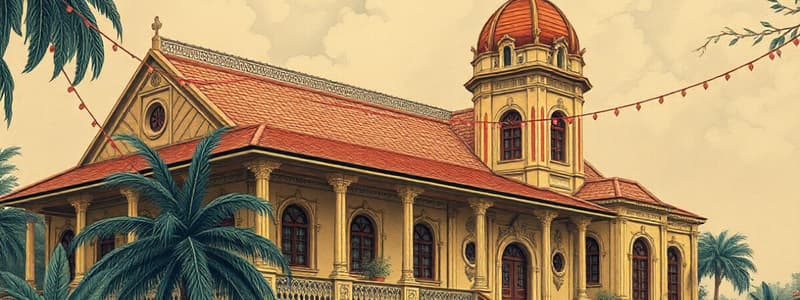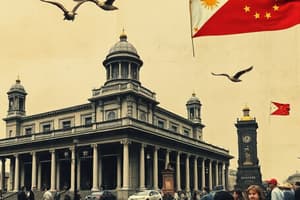Podcast
Questions and Answers
What significant event prompted Spain to grant representation to its overseas colonies in the Cortes?
What significant event prompted Spain to grant representation to its overseas colonies in the Cortes?
- The Spanish-American War
- The Filipino Revolution
- The Industrial Revolution
- The Napoleonic Invasion (correct)
Who was the first Philippine delegate to take part in the Spanish Cortes?
Who was the first Philippine delegate to take part in the Spanish Cortes?
- Ventura De Los Reyes (correct)
- Andres Bonifacio
- Emilio Aguinaldo
- José Rizal
Which of the following is NOT listed as an evil caused by Spanish misrule during Rizal's time?
Which of the following is NOT listed as an evil caused by Spanish misrule during Rizal's time?
- Human rights denied to Filipinos
- Instability of colonial administration
- Corrupt officialdom
- Economic prosperity (correct)
What was one of the achievements of Delegate De Los Reyes during his time in the Cortes?
What was one of the achievements of Delegate De Los Reyes during his time in the Cortes?
During which period did the Philippines experience its first representation in the Spanish Cortes?
During which period did the Philippines experience its first representation in the Spanish Cortes?
Which constitution was extended to the Philippines during the first period of representation in the Cortes?
Which constitution was extended to the Philippines during the first period of representation in the Cortes?
What characterized the second and third periods of Philippine representation in the Spanish Cortes?
What characterized the second and third periods of Philippine representation in the Spanish Cortes?
What was a notable consequence of the first period of Philippine representation in the Cortes?
What was a notable consequence of the first period of Philippine representation in the Cortes?
What was the role of the friar curate in the local governance during the Spanish rule in the Philippines?
What was the role of the friar curate in the local governance during the Spanish rule in the Philippines?
What was the prevalent issue with the courts of justice in the Philippines during Rizal's time?
What was the prevalent issue with the courts of justice in the Philippines during Rizal's time?
How did social status and race influence legal outcomes in the courts during the Spanish colonial period?
How did social status and race influence legal outcomes in the courts during the Spanish colonial period?
What was 'polo' and who was subjected to it?
What was 'polo' and who was subjected to it?
What was one consequence of the friar's influence over local governance?
What was one consequence of the friar's influence over local governance?
Which of the following best describes the treatment of brown Filipinos in the judicial system?
Which of the following best describes the treatment of brown Filipinos in the judicial system?
What was a primary characteristic of the Spanish judges and officials in the courts?
What was a primary characteristic of the Spanish judges and officials in the courts?
What was the age range of Filipino males required to provide forced labor during the Spanish colonial era?
What was the age range of Filipino males required to provide forced labor during the Spanish colonial era?
What was a key change introduced by the Royal Decree of July 12, 1883, regarding forced labor?
What was a key change introduced by the Royal Decree of July 12, 1883, regarding forced labor?
How did the Spanish authorities view converted Filipinos according to the content?
How did the Spanish authorities view converted Filipinos according to the content?
Which term did Spaniards and mestizos use to derogatorily refer to Filipinos?
Which term did Spaniards and mestizos use to derogatorily refer to Filipinos?
What was one way wealthy Filipinos could avoid forced labor during the Spanish colonial period?
What was one way wealthy Filipinos could avoid forced labor during the Spanish colonial period?
What social status did Spaniards and mestizos enjoy in the community during Rizal's time?
What social status did Spaniards and mestizos enjoy in the community during Rizal's time?
Who were the main owners of haciendas in the Philippines during Rizal's time?
Who were the main owners of haciendas in the Philippines during Rizal's time?
What derogatory term did Filipinos use to describe Spaniards?
What derogatory term did Filipinos use to describe Spaniards?
What was a characteristic of the Spanish political philosophy impacting society?
What was a characteristic of the Spanish political philosophy impacting society?
What was the average term of service for the governors general in the Philippines during the period from 1835 to 1897?
What was the average term of service for the governors general in the Philippines during the period from 1835 to 1897?
Which of the following best describes the colonial officials sent by Spain to the Philippines in the 19th century?
Which of the following best describes the colonial officials sent by Spain to the Philippines in the 19th century?
How did the Spanish missionaries view the concept of brotherhood among men?
How did the Spanish missionaries view the concept of brotherhood among men?
What was a significant contradiction observed in the Spanish colonial authorities' treatment of Filipinos?
What was a significant contradiction observed in the Spanish colonial authorities' treatment of Filipinos?
What was the role of the Spanish friars in the Philippines during the 19th century?
What was the role of the Spanish friars in the Philippines during the 19th century?
What aspect of governance characterized the last decades of Spanish rule in the Philippines?
What aspect of governance characterized the last decades of Spanish rule in the Philippines?
What was the perception of the Spanish colonial authorities towards the Filipino people?
What was the perception of the Spanish colonial authorities towards the Filipino people?
In what century did Spanish missionaries first introduce Christianity to the Philippines?
In what century did Spanish missionaries first introduce Christianity to the Philippines?
What was the unique form of government in Hispanic Philippines known as frailocracy characterized by?
What was the unique form of government in Hispanic Philippines known as frailocracy characterized by?
What did Jose Rizal attempt to achieve in 1887 regarding agrarian issues?
What did Jose Rizal attempt to achieve in 1887 regarding agrarian issues?
Which group retaliated against Rizal's advocacy for agrarian reforms by increasing rental prices?
Which group retaliated against Rizal's advocacy for agrarian reforms by increasing rental prices?
What was the primary purpose of the Guardia Civil as established by the Royal Decrees?
What was the primary purpose of the Guardia Civil as established by the Royal Decrees?
In contrast to their counterparts in Spain, the Guardia Civil in the Philippines was known for what behavior?
In contrast to their counterparts in Spain, the Guardia Civil in the Philippines was known for what behavior?
What incident sparked public resentment against the friars in the Philippines?
What incident sparked public resentment against the friars in the Philippines?
What was a common complaint against the Guardia Civil regarding their treatment of locals?
What was a common complaint against the Guardia Civil regarding their treatment of locals?
What was the relationship between the friars and the land in the Philippines during the Spanish period?
What was the relationship between the friars and the land in the Philippines during the Spanish period?
Flashcards are hidden until you start studying
Study Notes
Nineteenth Century Context
- The Philippines experienced instability under Spanish rule
- Spain granted the Philippines representation in the Spanish Cortes in 1810-1813
- The first delegate, Ventura De Los Reyes, had key contributions
- He helped frame the 1812 Constitution, which was extended to the Philippines.
- He also oversaw the abolition of the Galleon trade.
- The first delegate, Ventura De Los Reyes, had key contributions
- The 1820-1823 and 1834-1837 periods of representation were less fruitful, as the Philippine delegates lacked influence.
- Despite the constitutional liberties granted to Filipinos in Spain, they were denied those same rights in the Philippines.
Colonial Administration
- The Spanish colonial officials were corrupt and incompetent
- They were often cruel and used their positions for personal gain.
- The Spanish colonial authorities failed to implement the Christian principle of brotherhood, regarding the Filipinos as inferior beings.
Misadministration of Justice
- The courts of justice in the Philippines were corrupt and unjust
- Spanish judges, fiscals (prosecutors), and other court officials were incompetent and prone to bribery.
- Justice was slow, expensive, and biased against the Filipinos.
- Wealth and racial background heavily influenced the outcome of legal cases, with white Spaniards favored.
Frailocracy
- The Spanish clergy held significant power through the "frailocracy" (government by friars).
- The friars owned the best haciendas and influenced the civil government.
- They controlled education and political power, wielding significant influence over the governor-general and local officials.
- They had the power to exile or even execute anyone they deemed a threat to their authority.
Forced Labor
- The "polo," a compulsory form of forced labor, was imposed on Filipino men.
- Men between the ages of 16 to 60 were required to work for 40 days per year on public works projects.
- The wealthy could avoid this labor by paying a tax called the "falla."
- A Royal Decree in 1883 reduced the age requirement to 18 and the number of days of labor to 15. - However, the provision that required Spanish residents to perform forced labor was never implemented.
Hacienda System
- Friars owned most of the best haciendas (agricultural lands).
- Many Filipinos became tenants on these lands, resenting the loss of their ancestral properties.
- Rizal, whose family rented land, attempted to initiate agrarian reforms, but his efforts were stifled by the friars.
- The friars responded by raising the rents for his family and other Calamba tenants.
Guardia Civil
- The Guardia Civil, a Spanish military force established to maintain order, became notorious for abuses.
- They were known for maltreating innocent civilians, looting property, and raping women.
- Both the officers and men were poorly trained and undisciplined, unlike their counterparts in Spain.
Studying That Suits You
Use AI to generate personalized quizzes and flashcards to suit your learning preferences.




